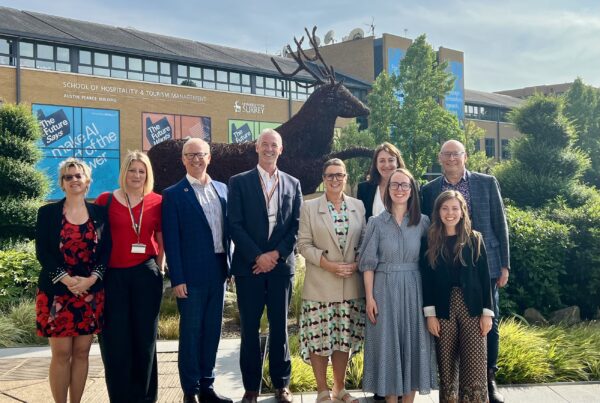How will we grow skills through equity using AI?
The focus of attention since last November for Australian higher education practitioners, leaders and commentators has been shared between the dramatic long-term impact of artificial intelligences (AI) and the short-term needs in the sector review of the Accord. Both have also been a focus for our students to some extent. Is the balance of focus the same?
An accurate definition of what AI technologies are, is complex for students and universities alike. Knowing when a tipping point in their impact on higher education, was or will be reached, appears uncertain. We know AI has been 70 years evolving and emerging as technologies from computer science able to replicate some aspects of human activity. The last 6 months changed everything regarding its potential impact on businesses and the future of work and skills needs of learners. Yet they hardly get a mention in the interim report of the Accord.
AI has undoubtedly changed the landscape for higher education irrevocably. It is leaving more of us needing to, and few of us currently able to, fully understand how or what its implications will be. It appears critically important that those reviewing the sector address it fully as an issue.
There is a growing body of knowledge on AI in education, arising from research. That now has potential to be combined with rapidly growing business experience exhibited in multiple sector best practices. We discussed these developments on the HEDx podcast in an episode you can access here. We dissected the state of various responses to breakthroughs in AI technologies.
The discussion we had surfaces the need for responses to be proportional by finding higher education problems as starting points. These starting points are needed to take the right next steps in exploring how AI will impact us all. We argue that doing so forms a roadmap for practitioners, leaders, institutions, and policymakers for the sector to explore a future for higher education as it will now be impacted by AI.
There is a clearly a need for responses to the technology and technologies from individual practitioners, universities and other HE institutions and their leaders. But a response is also needed for the sector as a whole. All responses must progress beyond some initial reactions of fear. We will all mature beyond head-in-the-sand attempts to ban the technology. But the more measured responses will take time to become established and thought through. That will require a broad base of us being armed with appropriate and relevant understanding and experience. They need ongoing research and ongoing access to global and out of sector best practice.
Several principles might guide us gaining our experience, and the understanding that arises from it. Being proportional is one of them. It might be easy to feel overwhelmed by the scale and extent of possibilities and the range of ways and areas in which AI might impact the learning processes and business operations of our sector. The best way of moving forward lies in defining manageable and bite-sized, specific HE problems and issues. We need these so that we can experiment with how AI can contribute. This requires a managed response within our institutions. This in turn calls for appropriate leadership, strategy, governance, and resourcing and management of new innovative processes. Research understanding will continue to inform some of these. Experience from practical implementations based on that research will also be needed.
Much of the leadership challenge is cultural and relates to the need to demonstrate, through role modelling behaviour, our ability to be vulnerable. We are not used to this.
Given that all leaders are ill-prepared and blind-sided by these technologies, the worse response would be to present as invulnerable, or ignore them. The process of developing understanding and experience, to help with a journey toward future mastery, comes from demonstrating and adopting authentic vulnerability. It needs a questioning and exploratory mindset.
A further principle that is enabled by cultural foundations of vulnerability, is to adopt exploratory behaviour into the specific and proportional problems and solving them through partnerships. These problems will be of both a pedagogic and administrative nature. Pedagogic matters obviously include academic integrity. But an over-focus on that from a controlling mind-set might lead to babies being thrown out with the bath water. It could add to our isolation from students who do not see being controlled as the opportunity they are looking for, nor one they need.
In a world of increased democratisation of HE, and with needs to ensure increased equitable student access includes support that leads to completions, applications focussed on student retention are a good place to start. This may include increased cooperation and collaboration with EdTech providers of student support services. It may also embrace increased collaboration with other technology and service providers to our sector who develop understandings of technologies in business and areas of future work skills. These may be in parallel and complementary to how academic and research environments advance technology and scientific and ethical expertise and experience.
The over-riding principle needs to be acting in our future students’ and learners’ best interests. Not doing so might add to our irrelevance and distancing and isolating our future customer base from seeing the value of our offering as worthwhile. These relate to the skills that students will need, and preferences they have for working and learning. They include attitudes they have for how rapidly advancing, and ubiquitous and feely available technology, can be used to help.
This creates a new and complex leadership and cultural agenda for practitioners and leaders to keep in step with students and learners. It also creates a dynamic policy challenge for the sectors’ leaders and policy makers when forecasts and preparations for long-term vision are being made.
At a time when the Australian Universities Accord is looking to reposition the sector and its institutions for a doubling of student completions by 2050, primarily from under-represented equity groups, ignoring the full potential contribution of AI to achieving that end, is an oversight. The most significant recent breakthrough productivity technology needs a bigger place in our plans than that. Given limitations of funding and the issues with student pipelines from our school system, this might be the only means of realising the vision.
The challenge to be proportional, vulnerable, and exploratory, with a student focus, is required of our sector leaders and policy makers, as behaviour to model. We then need leaders and practitioners throughout the sector to follow that lead to be truly focussed on future students and learners needs. This will need to embrace making visible global best practice learning experiences in a period of fast-paced continuous technological innovation alongside investing in the research into underpinning science and understanding.
First published in Campus Review on 28th August 2023.
Dr Ant Bagshaw, L.E.K. Consulting, Higher Education Practice Lead
Professor Martin Betts, Co-Founder of HEDx
Professor Rose Luckin, UCL and EDUCATION Ventures Research









